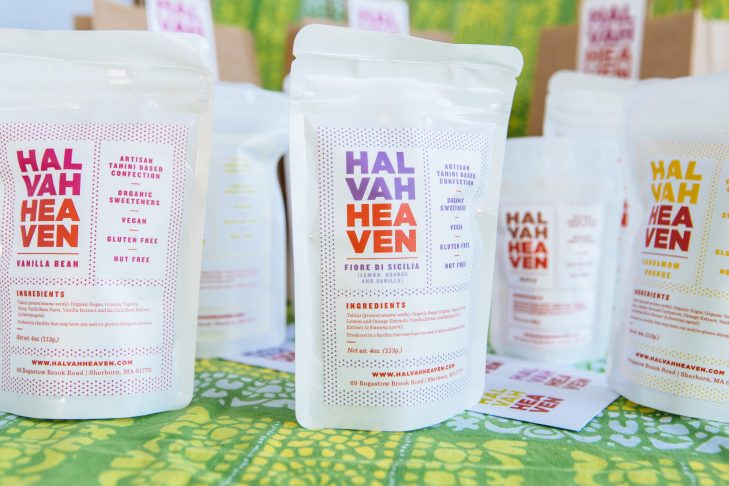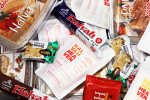“Have you had halvah? No? I need to send you some!” exclaims Victoria Wallins, the down-to-earth baker behind Halvah Heaven. The Sherborn resident is a self-confessed halvah addict, and she hopes to bring her beloved candy to the masses with her small-batch shop, found at health food stores and farmers markets throughout the area.
“So many people have no idea what halvah is. So many people don’t know what tahini is!” she marvels.
Wallins grew up in Newton savoring the flaky, fudgy, tahini-based, protein- and calcium-filled snack made with tahini and sugar syrup, popular in Eastern Europe and the Middle East. (For the truly confused, tahini is a sesame seed paste.)
“I crave it. I’m obsessed with it,” she says.
But, you see, not all halvah is created equal.
“If you look at the ingredients on some packages, you see all kinds of things like corn syrup and fake vanilla that you might not want to eat,” she says. Her version is gluten-free and nut-free, and it’s vegan.
Wallins thinks there’s an underserved market for halvah. Right now, there’s one major U.S. halvah factory, she says, Brooklyn’s Joyva Corp. Nobody does small-batch halvah.
True enough, halvah isn’t for everyone.
“I grew up in a family of unadventurous eaters. I’m the only one who liked it,” she admits.
But halvah has lots going for it, namely that it’s healthy.
“Sesame seeds are a quarter protein and half fat. It’s the oiliest seed on the planet, but it’s the good kind of oil that clears out cholesterol,” she says.
Plus, it’s versatile: Eat it on pita with butter for breakfast, or enjoy it alongside figs and dates as they do in Persia for dessert.
Wallins got her start running a coffee bar, Beans, in the 1990s in Brookline and at the Mall at Chestnut Hill. Later, she opened a clothing boutique, Essentia, in Wellesley.
But halvah was her true passion, so she took time to perfect a recipe. Today, she works out of a commissary kitchen in Warren, Vt., churning out a product made with organic tapioca syrup and organic sugar; stores like Cambridge’s Pemberton Farms and Formaggio Kitchen carry her brand.
“Mine is different than factory-made halvah, which use more sweetener in proportion to tahini,” she says. Hers is the other way around. Plus, she sells various flavors, like ginger lemon and honey rose.
Tempted? Intrigued? Visit her website to find out where to buy it. (And check out our recent taste-test here!)





